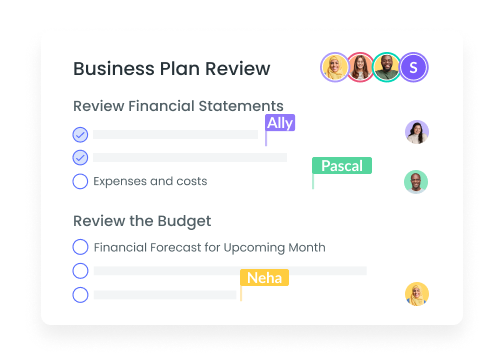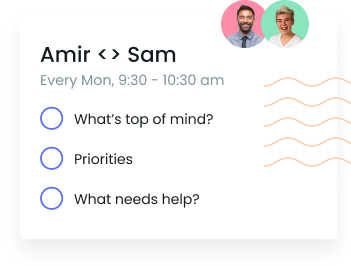Notice of Board Meeting Template
Encourage efficient and focused discussions with this informative Notice of Board ...
View templateEncourage efficient and focused discussions with this informative Notice of Board ...
View templatePlan and coordinate business travel with this business travel meeting agenda templ...
View templateEnsure a reflective and forward-looking annual meeting with this meeting template....
View template
Keeping everyone on the same page with this sync up meeting agenda template design...
View templateUse this monthly leadership agenda to guide dynamic discussions on strategic initi...
View templateKeep your office staff meetings on track with this agenda template that includes k...
View template
Make your supervisor meeting energizing and effective with this agenda template de...
View templateBoost productivity, drive collaboration, and make every manager meeting count! Thi...
View templateWhen acquiring a business, often the due diligence checklist is not enough. Often ...
View template
Use this Acquisition Planning meeting template to ensure a successful acquisition ...
View templateRun organized and efficient meetings with this simple agenda template. Encourage a...
View templateUse this template to create a business budget to forecast the year’s income and ...
View template
A business meeting is a gathering of professionals within an organization or between businesses. While the specific topics of these meetings can range from regular team meetings to high-stakes negotiations, oftentimes individuals discuss operations, projects, challenges and accomplishments. Business meetings might occur in person or online, depending on the circumstances and preferences of the attendees.
To conduct a business meeting, start by identifying a clear purpose and set objects for what you want to accomplish. With this in mind, invite the necessary people and create a meeting agenda that includes the topics that you would like to discuss. When it comes time for the meeting, facilitate the conversation by going through the topics on the agenda, and jotting down notes and action items as they come up. End the meeting with actionable next steps and a summary of key decisions to ensure all participants are on the same page.
The primary purpose of a business meeting is to foster communication and collaboration. These meetings serve as a platform for decision-making, problem-solving, strategy development, and alignment on goals/projects. Ideally, these meetings are an opportunity to move work forward.
The steps to prepare for a business meeting may vary depending on whether you are the organizer or a contributor. For organizers, it’s important to clearly define the meeting’s goals and objectives before scheduling the meeting. To prepare for the meeting, organizers should create a focused agenda that outlines topics for discussions. It’s often a good idea to share the agenda and any other resources with the other attendees prior to the start of the meeting. If you are not the meeting organizer, prepare for the meeting by reviewing the agenda and gathering any necessary information or resources. If your team uses a collaborative meeting management platform like Fellow, contributors can also prepare for the meeting by accessing the shared agenda and adding any additional talking points that they would like to discuss.
While topics may vary depending on the type of meeting, a well structured business meeting typically begins with an introduction and/or a review of the meetings objectives. From there, systematically go through the discussion topics on the agenda, allowing time for questions and input from participants. End the meeting with documented action items and next steps.
One way to enhance the effectiveness of a meeting is to limit attendees to only the essential participants. Studies have shown that “every attendee over 7 reduces the likelihood of making a good, quick, executable decision by 10%”. Other ways to increase the effectiveness of these meetings include encouraging participation from all attendees, sticking to the agenda, and ensuring that the meeting ends with assigned action items (complete with due dates).